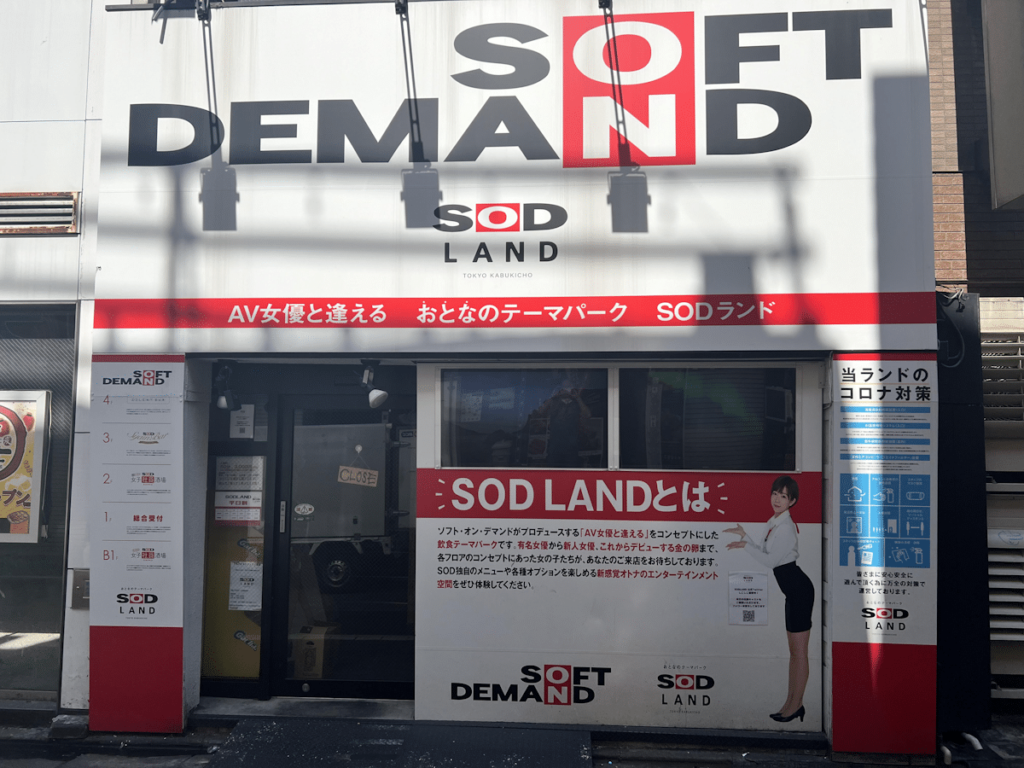[ad_1]
One of Japan’s largest adult video (AV) makers found itself in some tough straits last year when police busted them for operating a Kabukicho bar without a license. Now, SOD Land is back, and the parent company’s CEO is apologetic. But he’s also sore about how much complying with the law cost him.
The crackdown

Soft on Demand (SOD) is a major maker and distributor of adult videos in Japan. Running since 1995, the company boasts over 1.2 billion yen in sales (around USD $80 million) and a yearly profit of around 400 million yen (USD $2.6 million).
Not content to make money just from its main business, SOD has branched out into Japanese nightlife. It ran its own brand of reflexology massage clinics from 2010 to 2015. It opened Joshi Shain Sakaba (Salarywoman’s Watering Hole), a “drinking while standing” (立ち飲み; tachinomi) bar patterned after its Joshi Shain video series, in 2018.
In 2020, it launched its most ambitious project to date. SOD Land in Kabukicho opened with what seems like a compelling concept: come drink with our stars! And it was. The store raked in over USD $5,000 a night, making USD $5 million yearly.
Only it had one tiny problem.
SOD Land fell under the umbrella of a settai (接待), or customer contact business – a category of nightlife entertainment that includes cabaret clubs and host clubs. In these businesses, hosts or hostesses sit at tables with the guests, drinking and engaging in light physical contact with them.
Operating as a settai business requires a social bar license, which carries with it a number of restrictions and preconditions. SOD Land never bothered to get this license. After two warnings, police arrested SOD’s CEO and the club manager’s and shut the place down.
Advertisements
Dodging the costs of a social bar license
The store finally reopened in August 2023. Friday Digital caught up with the head of SOD’s parent company, Sayaka Land’s CEO Takaoka Tetsuya (高岡哲也), and asked: What the hell, man?
In a very indirect way, Takaoka blamed the store’s female employees for the company’s foot-dragging. “We wanted to give our actresses a second career where if someone asked them, ‘what do you do?’, they could reply, ‘I work in the restaurant business’.” Hence, Takaoka insists, they first tried to change how they did business to keep operating under a restaurant license.
But as Friday’s interview progresses, it becomes clear the company likely had another motive: money. A social bar license carries numerous onerous restrictions that Sayaka Land clearly wanted to dodge.
Takaoka said that, since SOD Land didn’t involve the waitresses sitting directly with customers, they didn’t feel they needed to bother with a social bar license. Instead, after police gave them their first warning, they made minor improvements such as removing the space’s U-shaped bar and switching to standing tables.
After the second warning, they again decided to try and shoehorn the business into a restaurant license. This, despite the main advertised attraction of SOD Land being the opportunity to drink with porn stars.
The (costly) revival

After police arrested two of its employees, SOD Land finally decided, hey, maybe we should get that social bar license after all.
It didn’t come cheap, however. Rumors have it that the company spent 200 million yen (currently USD $1,333,840) to open SOD Land in 2020. The renovation required to secure a social bar license brought even more costs.
For example, one regulation says that you can’t have anything in a room that services customers, such as a mirror or a partition, that’s over one meter high and can obstruct line of sight. That meant that SOD Land had to completely tear up and rebuild its 4th-floor “Magic Mirror” room. Takaoka said the company asked employees to chip in to help lower the cost of that renovation from an estimated 5 million yen ($33,344) down to 500,000 yen ($3,344).
Takaoka pleaded poverty as a reason for the company’s stinginess. “We make an average of 10,000 yen [$67] per customer,” he argued. He contrasts this to a cabaret club, where customers may spend that much as a base fee for a single hour – and which, like host clubs, are constantly plying customers with incentives to spend more.
Remember, this is a store that reportedly makes more than double its opening costs every year. Given that, Takaoka’s excuses don’t feel like they go very far.
SOD Land secured its social bar license in August 2023 and is back up and running. Its cast of 200 – half of them women – are back at work. To think that this whole ruckus, and the ensuing turmoil for employees, could’ve been avoided with a little upfront planning – and a little less stinginess.
Sources
経営者「うかつだった」拘留社員の“戻れるなら戻りたい”で再出発 歌舞伎町「SOD LAND」の今. Friday Digital
ソフト・オン・デマンド. Wikipedia JP
[ad_2]
Source link



